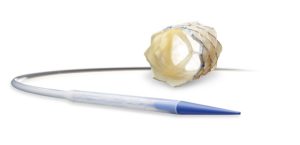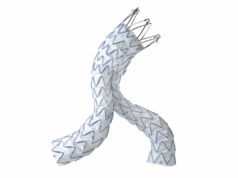
A late-breaking clinical trial presented at the virtual Society for Cardiovascular Angiography and Interventions (SCAI) 2020 Scientific Sessions (14–16 May, Eastern Time) demonstrated strong long-term haemodynamic and safety outcomes for the Melody transcatheter pulmonary valve (Medtronic). Additionally, results from a second late-breaking trial—for the investigational Harmony transcatheter pulmonary valve (also Medtronic)—met its safety and efficacy endpoints for haemodynamic function at six months.
The Melody transcatheter pulmonary valve 10-year outcomes trial studied 150 implanted patients ranging from age 7–53, with a median age of 19, and the primary indication for intervention was pulmonary regurgitation. The study assessed Melody’s long-term functionality, or transcatheter pulmonary valve dysfunction, which is defined as reoperation, catheter reintervention, or haemodynamic dysfunction (i.e. moderate or greater pulmonary regurgitation and/or mean RVOT gradient >40mmHg). The study’s safety outcomes included serious device-related adverse events, stent fracture, catheter reintervention, surgical conduit replacement, and mortality rate.
The 10-year data highlights:
- The study demonstrated sustained long-term function of Melody transcatheter pulmonary valve when compared to the historical control of surgical conduit
- The Melody transcatheter pulmonary valve demonstrated consistent haemodynamics through 10 years as measured by stable RVOT gradients
- Strong valve efficacy with 97% none/trace/mild pulmonary regurgitation at 10 years
- Annualized incidence of TPV-related endocarditis was 2% per patient-year, over the course of long-term follow-up
- Freedom from major stent fracture 84% at 10 years, steady after five years
- Freedom from any reintervention (surgical or catheter) was 61% at 10 years.
Thomas K Jones (Seattle Children’s, Seattle, USA) says: “Having long-term data is an important milestone especially for this paediatric patient population who are growing and changing so rapidly during a 10-year period. While the study reinforces the longevity, durability, and efficacy of the Melody transcatheter pulmonary valve, it will also serve as a study model for future evaluations of novel paediatric congenital heart disease technologies.”
As part of the Medtronic congenital heart disease programme, a press release reports, the safety and effectiveness of the Harmony transcatheter pulmonary valve is currently being evaluated for patients with right ventricular outflow tract (RVOT) malformations who require a correction to their structural malformation early in life and need a minimally invasive option to restore pulmonary valve function, and are without a conduit. Data presented at SCAI 2020 show:
- The study met its primary safety and effectiveness endpoints of freedom from procedure or device-related mortality and met its haemodynamic function target at six months
- 100% of patients experienced freedom from procedure-or device related mortality at 30 days
- Acceptable haemodynamic function at six months was achieved in 89% of the pivotal trial participants. For the pre-specified primary endpoint analysis, 91% of patients from both the EFS and pivotal trial achieved acceptable hemodynamic function, surpassing the performance target of 75%
- 84% of patients were free from device failure at six months
- At six months, 94% of patients had no, or mild pulmonary regurgitation and 97% had no or mild paravalvular leak.
John P Cheatham (Nationwide Children’s Hospital, Columbus, Ohio, USA), lead principal investigator, comments: “These pivotal data support the rationale for a potential new therapy designed specifically for the right ventricular outflow tract. If future study data continue to be strong, we are hopeful that Harmony may potentially impact this critical, hard-to-treat segment of patients, who have limited treatment choices with current transcatheter technologies.”










